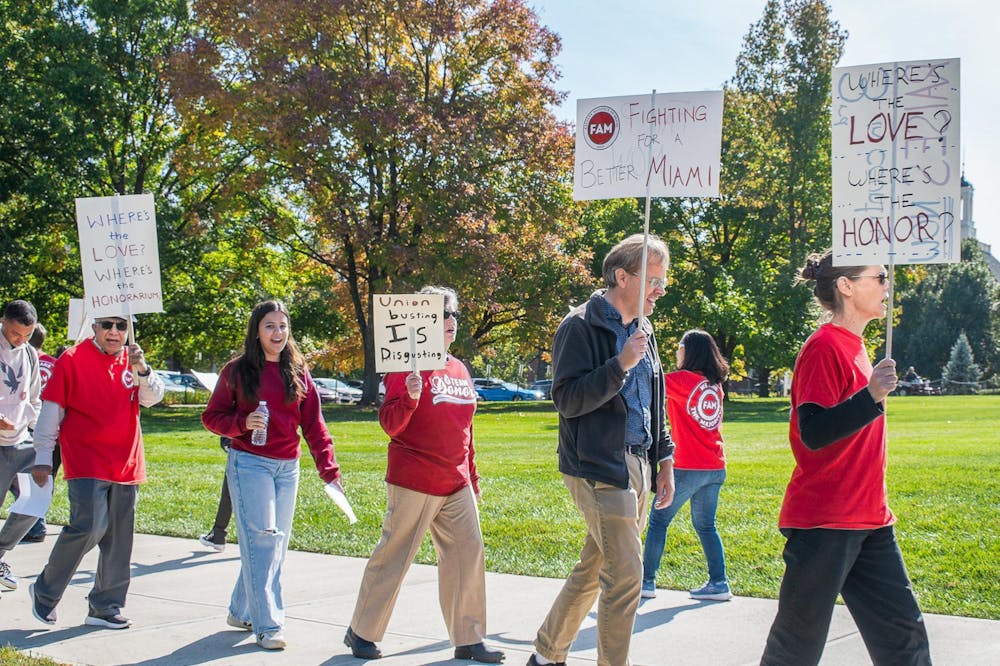Two years ago, I sat before a Miami University committee deliberating on Title IX Case #20223189. My case.
I thought my raw honesty about sexual assault would be enough to secure justice. I described physical trauma, isolation and the way violence had reshaped my entire worldview.
Instead, my sexual assaulter faced no consequences, and I learned a harsh lesson: institutions don’t want messy, complicated victims who demand accountability. They want victims who fit neatly into its crisis management playbooks – grateful, composed and, most importantly, not disruptive to a carefully-crafted image.
Now, as a senior ready to graduate with two degrees, I’ve learned a lot. I’ve discovered that the same dynamics that silenced me as a survivor are deployed against faculty and staff who dare to speak up about working conditions, fair wages and educational quality.
Sociologist Nils Christie wrote about this decades ago. The “ideal victim” is innocent, passive, grateful and pure. I was none of these things. My rage and refusal to be gracious violated expectations of virtuous suffering. Worst of all, my demands for systemic accountability threatened the institution's preferred story of an “isolated incident” rather than a structural problem.
Faculty and librarians face the same impossible bind. They’re expected to be passionate enough about education to work for below-market wages, but not so passionate that they demand the resources and class sizes necessary to do their jobs well. They should care about the students, but not so much that they criticize administrative decisions that harm educational quality.
I have never felt more supported than when my professors and librarians showed up for me – not in official procedures, but through ebook recommendations, in quiet offices and whispered encouragements: “We believe you.”
My lived experiences and sociology studies have taught me that they face the same institutional struggles, though in different forms. Their union is working toward a university that values its people over public relations. In their struggle, I recognize my own.
Anthropologist James C. Scott describes the difference between metis (practical wisdom from lived experience) and techne (bureaucratic knowledge divorced from lived reality). Faculty and librarians possessed metis – they understood my needs because they’ve worked directly with students experiencing hardship. Administrators operated from techne – following protocols designed to minimize liability rather than maximize human flourishing.
Faculty and librarians know what students need. Survivors know what justice looks like. Yet when we speak with conviction, we are deemed threats to the institutional image.
Writer and scholar Sara Ahmed wrote about how institutions perform diversity and care for branding, while weeding out anyone who might challenge the system. Historian and philosopher Hannah Arendt warned of the “banality of evil,” the way harm is carried out not by villains, but by everyday people who choose loyalty to procedure over moral courage.
We see this every time a survivor is told, “We’re sorry you were harmed, but we can’t take sides.” We see it every time a professor is told, “We value your work, but there's no budget.”
Enjoy what you're reading?
Signup for our newsletter
My case was framed as an isolated incident requiring individual healing rather than systemic reform. Faculty concerns are dismissed as labor disputes unrelated to the educational mission. This separation is strategic as acknowledging the connections would demonstrate how thoroughly the institution prioritizes self-preservation over “Love & Honor.”
The solution isn’t better individual performance within an exploitative system. It’s recognizing these intersecting struggles and building solidarity across them. This looks like supporting survivor advocacy and faculty unions not as separate causes, but rather interconnected fights against institutional powers that prioritize image over justice and profit over education.
Sexual assault survivors may never truly get justice from these institutions, but we can build something better: a community that chooses truth over performance, solidarity over silence and love over fear.
So this is where I stand now: broken in some ways, but unbowed. I reject the performance of the "ideal victim.” I reject the narrative that asks faculty, librarians and survivors alike to stay quiet for the good of the institution. I believe the same systems that protect predators also protect exploitation, and the same solidarity that challenges one can transform both. We are fighting for a reality where care is real – not staged – and where justice is about the people, not liabilities.
Pixie Menezes is a senior studying organizational leadership and sociology. She is a proud member of Sigma Lambda Gamma National Sorority Inc. and is involved in multiple activism and diversity-related organizations on campus.




